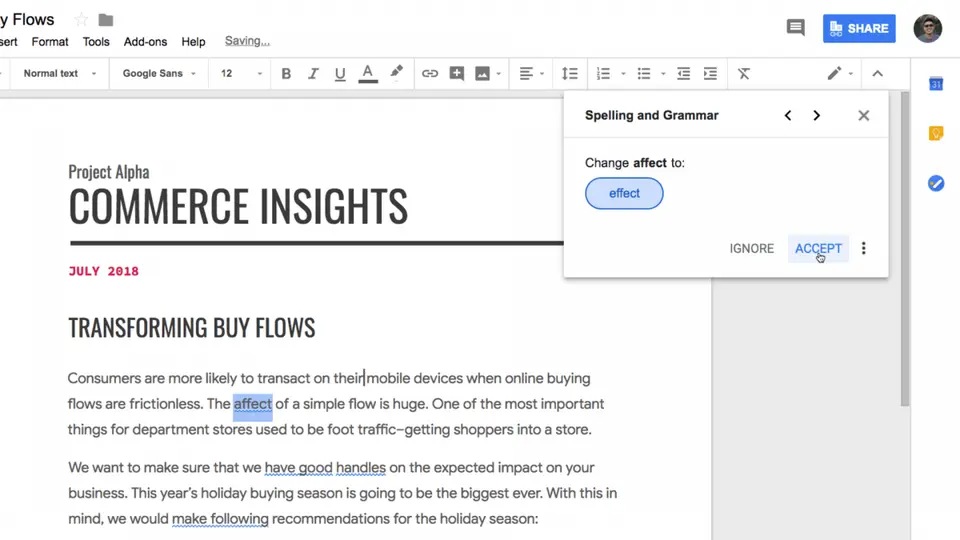At the Marketing AI Institute, we read dozens of articles on artificial intelligence every week to uncover the most valuable ones for our subscribers and we curate them for you here. We call it 3 Links in 3 Minutes. Enjoy!
New AI Grammar Checker for Google Docs
Move over Grammarly; there’s a new spell checker in town.
According to Mashable, Google is set to release a new feature for its online word processing product Docs that will compete with Microsoft Word’s “Editor Pane” and Grammarly.
In addition to checking spelling and punctuation, the new “grammar suggestions” tool will catch and suggest corrections for all sorts of language mistakes, such as article errors (“a” versus “an”) and dangling subordinate clauses.
The tool uses machine translation to discover mistakes and machine learning to improve this capability over time.
This and Google’s other new features such as Smart Reply and Smart Compose are all part of the company’s “increasingly AI-centric services.” In an area where Google has traditionally lagged behind competitors like Microsoft, these time-saving tools may be a way to differentiate.
Innovative AI Martech
TechRepublic just released a list of the ten most innovative companies in machine learning as reported by Analytics Insight Magazine. Read on for our favorites as they pertain to marketing.
Dotphoton is a compression solution company in Switzerland that uses a new file format with impressive storage space and the ability to transmit high-quality photo and video.
Dynamic Yield uses machine learning to help marketers increase revenue through personalization, automatic optimization, recommendations, and messaging.
Smadex is a mobile-first solution powered by machine learning for branding and performance marketers.
AI Wants to Be Your New Basketball Coach
Since we’re based in Cleveland, Ohio, we’re practically required to share Futurism’s post on how AI can unleash your inner LeBron.
New iPhone app HomeCourt wants to improve basketball players’ shot using artificial intelligence. If the phone is propped up and aimed at the user, the app can track the position and success rate of each shot. From there, it offers real-time feedback and spliced videos of each shot—no physical coach necessary. Hiring a personal coach is expensive and requires coordinating schedules. HomeCourt is free, portable, and enables athletes to work remotely with their team.
HomeCourt’s co-founder David Lee is excited about how the app will be able to serve players moving forward.
“In the future, we believe we can provide a platform where coaches and trainers can be actively training and coaching their players through the app from anywhere, anytime.”
Currently, there are other apps on the market that let athletes review video footage, but HomeCourt is the first to leverage the expertise that comes from an AI-powered machine.
Ashley Sams
Ashley Sams is director of marketing at Ready North. She joined the agency in 2017 with a background in marketing, specifically for higher education and social media. Ashley is a 2015 graduate of The University of Mount Union where she earned a degree in marketing.



